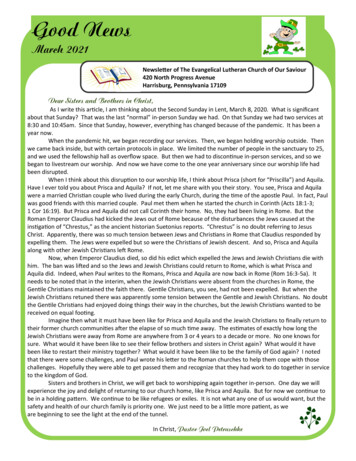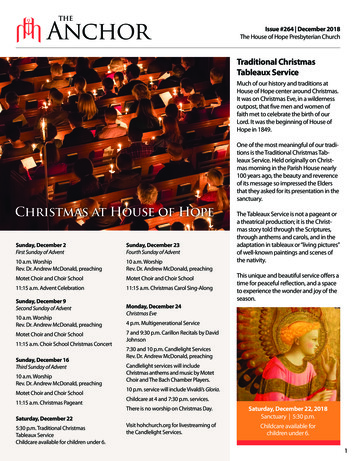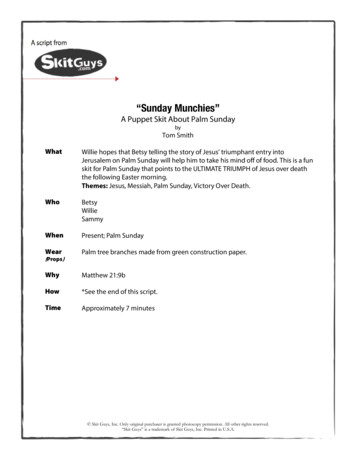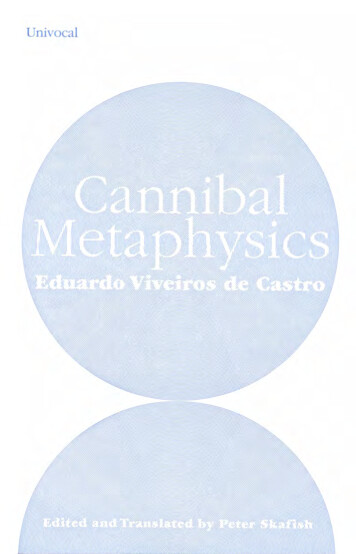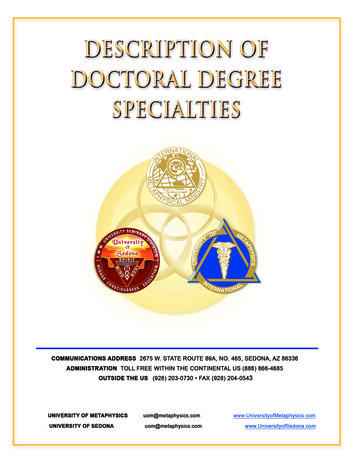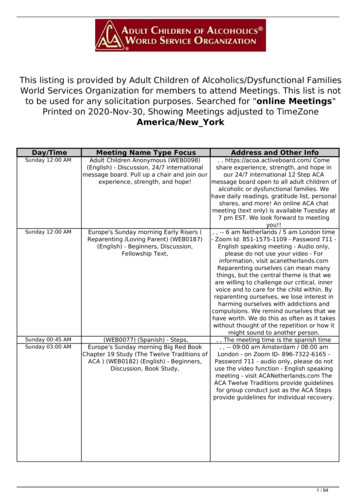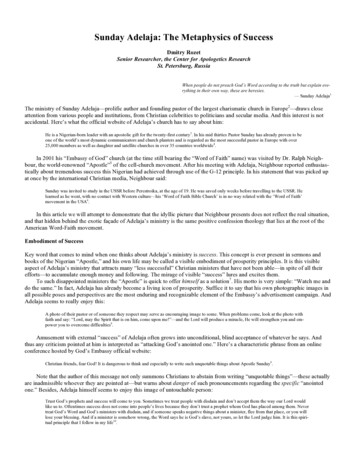
Transcription
Sunday Adelaja: The Metaphysics of SuccessDmitry RozetSenior Researcher, the Center for Apologetics ResearchSt. Petersburg, RussiaWhen people do not preach God’s Word according to the truth but explain everything in their own way, these are heresies.— Sunday Adelaja1The ministry of Sunday Adelaja—prolific author and founding pastor of the largest charismatic church in Europe2—draws closeattention from various people and institutions, from Christian celebrities to politicians and secular media. And this interest is notaccidental. Here’s what the official website of Adelaja’s church has to say about him:He is a Nigerian-born leader with an apostolic gift for the twenty-first century3. In his mid thirties Pastor Sunday has already proven to beone of the world’s most dynamic communicators and church planters and is regarded as the most successful pastor in Europe with over25,000 members as well as daughter and satellite churches in over 35 countries worldwide4.In 2001 his “Embassy of God” church (at the time still bearing the “Word of Faith” name) was visited by Dr. Ralph Neighbour, the world-renowned “Apostle”5 of the cell-church movement. After his meeting with Adelaja, Neighbour reported enthusiastically about tremendous success this Nigerian had achieved through use of the G-12 principle. In his statement that was picked upat once by the international Christian media, Neighbour said:Sunday was invited to study in the USSR before Perestroika, at the age of 19. He was saved only weeks before travelling to the USSR. Helearned as he went, with no contact with Western culture—his ‘Word of Faith Bible Church’ is in no way related with the ‘Word of Faith’movement in the USA6 .In this article we will attempt to demonstrate that the idyllic picture that Neighbour presents does not reflect the real situation,and that hidden behind the exotic façade of Adelaja’s ministry is the same positive confession theology that lies at the root of theAmerican Word-Faith movement.Embodiment of SuccessKey word that comes to mind when one thinks about Adelaja’s ministry is success. This concept is ever present in sermons andbooks of the Nigerian “Apostle,” and his own life may be called a visible embodiment of prosperity principles. It is this visibleaspect of Adelaja’s ministry that attracts many “less successful” Christian ministers that have not been able—in spite of all theirefforts—to accumulate enough money and following. The mirage of visible “success” lures and excites them.To such disappointed ministers the “Apostle” is quick to offer himself as a solution7. His motto is very simple: “Watch me anddo the same.” In fact, Adelaja has already become a living icon of prosperity. Suffice it to say that his own photographic images inall possible poses and perspectives are the most enduring and recognizable element of the Embassy’s advertisement campaign. AndAdelaja seems to really enjoy this:A photo of their pastor or of someone they respect may serve as encouraging image to some. When problems come, look at the photo withfaith and say: “Lord, may the Spirit that is on him, come upon me!”—and the Lord will produce a miracle, He will strengthen you and empower you to overcome difficulties8.Amusement with external “success” of Adelaja often grows into unconditional, blind acceptance of whatever he says. Andthus any criticism pointed at him is interpreted as “attacking God’s anointed one.” Here’s a characteristic phrase from an onlineconference hosted by God’s Embassy official website:Christian friends, fear God! It is dangerous to think and especially to write such unquotable things about Apostle Sunday9.Note that the author of this message not only summons Christians to abstain from writing “unquotable things”—these actuallyare inadmissible whoever they are pointed at—but warns about danger of such pronouncements regarding the specific “anointedone.” Besides, Adelaja himself seems to enjoy this image of untouchable person:Trust God’s prophets and success will come to you. Sometimes we treat people with disdain and don’t accept them the way our Lord wouldlike us to. Oftentimes success does not come into people’s lives because they don’t trust a prophet whom God has placed among them. Nevertreat God’s Word and God’s ministers with disdain, and if someone speaks negative things about a minister, flee from that place, or you willlose your blessing. And if a minister is somehow wrong, the Word says he is God’s slave, not yours, so let the Lord judge him. It is this spiritual principle that I follow in my life10.
Note that according to this statement our success depends ultimately not on the will of God or even on our faithfulness to God,but on our trust in a man, who claims to be a prophet! For those who are not afraid to “lose their blessing” Adelaja has got anotherargument:Desire to critique other people, preachers, is not a fruit of the Holy Spirit. Even if there is every reason for critique, remember that love covers everything11.It is hard to dispute that desire to critique is not natural for a Christian. Nevertheless if there is “every reason for critique” wemay and we should “laying aside falsehood, speak truth with our neighbors” without respect of persons—because we are “members one of another,” and God sees no difference between us (Eph. 4:25).The Bible never calls us—even by way of allusion—to sacrifice truth in the name of love. On the contrary, Paul summons believers to “speak truth in love” (Eph. 4:15), that they may “no longer to be children, tossed here and there by waves and carriedabout by every wind of doctrine.” Truth and love are inseparable in Christian life.Besides, when truth is at stake, there can be no unquestionable human authorities for Christians. Apostle Paul demonstratesthat clearly in his Epistle to Galatians: “ those who seemed to be something—whatever they were, it makes no difference to me;God shows personal favoritism to no man ” (2:6). When Peter, who was “reputed to be a pillar” by the Early Church (2:9), was“not straightforward about the truth of the gospel” in Antioch, Paul “opposed him to face” and rebuked him “in the presence of all”(2:11, 14). I think it will not be an overstatement to say that we should follow the apostolic example.Unfortunately, there really is every reason to critique Adelaja’s theology—many of his followers, hypnotized by his personal“prosperity” and quasi-biblical rhetoric, simply don’t recognize that in this nice and exotic wrapper they are being fed by the sameold prosperity doctrine adopted from the notorious Word-Faith Movement.ContextIt is possible that Adelaja was introduced to the Positive Confession theology before his coming to Minsk in 1986. Nigerian Pentecostalism is known for its close ties with the American Word-Faith movement. Here’s an assessment of the situation in Nigeriafrom J. Lee Grady, the editor of Charisma magazine:Although the growth of Nigerian Christianity is spectacular when compared to the West, a growing number of younger, innovative churchleaders in the country say the revival there is fraught with problems. They say most Pentecostal churches are mired in legalism. Many pastors,they add, have adopted an American model of celebrity Christianity—which has been eagerly embraced by a patriarchal African culture thatstruggles with hero worship. People follow their leaders rather than God “The problem here is that Pentecostal Christians simply trade their occult oracles for their pastor. This is perversion,” says Lagos pastorTony Rapu, 44, a leading proponent of reform in the Nigerian revival movement. Some critics including Rapu blame the American WordFaith movement for the problem. They say a cheap version of the “prosperity gospel” message was welcomed in Nigeria and that preachershave used it to enrich themselves.“It has become a sham,” says one Christian professional from the eastern Delta region who requested anonymity during his interview.“I know of churches where they will not pray for you at the altar unless you give money first. They teach that you must give a seed first inorder to receive any kind of blessing.”“In some cases the prosperity the preacher enjoys is not trickling down to the people," adds Ashimolowo [a Nigerian-born leader of thelargest church in England].—“There is some teaching of prosperity in Nigeria that is without balance.”However, Ashimolowo is not quick to point a finger at American faith preachers. He believes that books about healing, prosperity andtithing by Oklahoma-based Bible teacher Kenneth Hagin Sr. have fueled Nigeria’s revival since they began circulating there in the 1970s.This literature offered Nigerian pastors theological training when materials were scarce and seminaries weren’t accessible.[ ]There is no question that Nigeria has been fertile ground for the American faith message. Kenneth Hagin Sr.’s teachings on healing andprosperity have enjoyed wide circulation in Nigeria since the 1970s, partly through the influence of Nigerian megachurch leader Benson Idahosa. Kenneth Copeland, Jerry Savelle, John Avanzini and many other preachers who specialize in the prosperity message have huge followings in the African country12.But even if Adelaja was not introduced to the Word-Faith ideas in his homeland (as Neighbour declares), he certainly had thisblank filled in the late 1980s while studying at the Belarusian State University in Minsk:During my college years in Minsk I was corresponding with pastor Kenneth Hagin. He sympathized with me and encouraged me. In one ofhis letters Hagin suggested that I should study at his Bible school13.Adelaja never made it to the Rhema Bible School—he went to the Ukraine instead—but retained his esteem for the theologyand accomplishments of the “Father of the Word-Faith Movement” to this day14. In Sept. 2006, in response to a question posted tothe official site of his church, Adelaja called Hagin “a distinguished man” who “influenced his destiny”15.What’s more, in a 2006 interview given to Mikhail Kolpakov, Adelaja said:During the meeting with Kenneth Jr he allowed me to come in the prayer room of his father. In this prayer room father Kenneth Haganworked till the last day of his life. Kenneth Jr said that I am first one to come in this room ever since the time his father died. So a symbolictransference of his father’s calling to me was held16.But the Word-Faith connections of the Adelaja are not limited to his personal relationships with Hagin. In his books he mentions other Faith teachers—Paul Crouch, Lester Sumrall, Benny Hinn, Joyce Meyer, Reinhard Bonnke, David Yonggi Cho—and
the official website of “the Embassy of God” carries announcements of Adelaja’s meetings and joint projects with Kenneth Copeland, Creflo Dollar, the late Billy Joe Daugherty, Marilyn Hickey, and Kenneth Hagin Jr.Admittedly, Adelaja maintains his original style and shows a certain independence in some of his views, but there’s no doubtthat one should look for the roots of his theology in the Word-Faith Movement.ContentsIt is a pretty complicated task to analyze Adelaja’s ideas, because like most of his Western “colleagues” he apparently does notdeem it necessary to present his teachings in any comprehensive and systematic form. Thus a researcher would have to undertake alaborious and thankless work of searching Adelaja’s numerous writings for scattered bits and pieces of doctrine and assemblingthem into a relatively cohesive sequence. I call this work “thankless” because Adelaja’s advocates may easily brush its results asideby saying that he never presented his doctrine in this precise way. But if he is not willing to put his own teachings in order, we areleft with a task of doing that in his stead—and don’t blame us if we bring to logical conclusion some ideas that Adelaja himselfwould rather leave hanging in the mid-air.To make things even more complicated, Adelaja seems to begin each new book “from scratch.” Whatever topic he pickson immediately becomes the essence of divine-human relationships and the key to solution of any and every problem. Thus inevery new book he presents his thoughts in a slightly different way, and even parallel statements in his numerous writings whencompared do not always assemble in a logical and cohesive picture.SuccessAs previously stated, the most visible and attractive aspect of Adelaja’s teachings is his notion that “all believers are obliged tohave success in their lives”17. This statement coupled with Adelaja’s favorite Bible verse—“And the LORD shall make thee thehead, and not the tail; and thou shalt be above only, and thou shalt not be beneath” (Deut. 28:13)—wander from one his book toanother.In the meantime, Christians who happened to live before the Kiev “apostle” stepped upon the stage of history seemed to haveno idea of this “obligation” whatsoever Even today many faithful servants of God suffer from hunger, poverty and deprivation.Most probably they don’t know the “secret of success” discovered by Adelaja:The secret of success is to know God’s will and to fulfill it in your life18.Can it be that simple? Can it be that many generations of Christians left without earthly prosperity didn’t know or follow thewill of God? Well, blasphemous as it may sound, this is precisely the point—that is, if you agree with Adelaja’s understanding ofGod’s will:[God’s will] is that God has no interest to bless you scantily19.Someone may say that Adelaja certainly has spiritual, not material blessings in mind and that by “success” he means effectiveministry and righteous living. To be sure, Adelaja does say that success “is not measured by the wealth of money or possessionsone can accumulate.” Nevertheless it should not be denied that [success] includes material wealth as well. Life without it is hard. The material aspect of life is created byGod Himself, thus it is very important. And Creator alone knows how we should live and how we are to use material values. This bringsout the conclusion: there can be no success without material wealth20.In his other books Adelaja makes himself even more clear:To be poor is not a believer’s destiny. God is interested in the well-being of His people21.Remember: St. Paul labels those who think that godliness could be used for material gain as “men of corrupt minds,” “destitute of the truth” and summons us to “withdraw from such” (1 Tim. 6:5). Instead he persuades us to be content with “having foodand raiment,” and to “flee” the desire to be rich. He says: “Godliness with contentment is great gain” (6:6).But there is no place for contentment (i.e. being satisfied with what you already have) in Adelaja’s system of values. He onlysees it as a pledge of defeat, a root of all failures and an impediment to “abundant living”:One misfortune of people in this world and the reason of their not being able to achieve anything significant in their lives is that they arecontent with what they already have. They use to say: “I have an average life, I am not poor, I am just like anyone else. I have everything Ineed in this life.” The name of your enemy is “being average.” [ ] you cannot be average. You have to live in blessing 22Adelaja himself can hardly take blame for excessive humility—according to him, Christians have to be not only prosperous,but the most prosperous and influential people in the world:
It is to us Christians that all treasures of the world belong to. According to the Law of God we ought to be the most successful, the mostwealthy and prosperous people23.I’d like to tell you that if you attend this church, you cannot be unsuccessful! You cannot be anybody else but the mightiest person on thisearth!24What is more, these untold riches are to be acquired with no effort:Thus now you will be achieving great results and quick progress in all spheres of your lives. That which others struggled to earn by decades of ceaseless labor, you will have without much effort and in short time25.Wise Solomon used to say: “A faithful man shall abound with blessings: but he that maketh haste to be rich shall not be innocent” (Prov. 28:20). Lord Jesus also said: “Where your treasure is, there will your heart be also” (Mat. 6:21). Adelaja and his followers love to talk about “unchanging principles,” so here’s a good one for them: strife for easy money never goes unpunished.Even if one does not fall away from the faith, his or her heart will gradually fill up with pride. Nevertheless Adelaja continues topush his followers to this dangerous threshold:The Bible says that we—unlike those in the world—are a different sort of people, which is called supreme26.God has already found us, He didn’t save us by accident, and thus we are already better than all those unsaved27.There will be no limit to our success as long as we live, believe in ourselves and strive for new achievements28.Belief that you are capable of anything and that God wants to use you is the beginning of your road to success29.Do I have to say that biblical believers treated their “greatness” in a radically different way? St. Paul, for example, calls himself “the chief of sinners” (1 Tim. 1:15) and says that Christians have the treasures of God’s salvation “in earthen vessels, that theexcellency of the power may be of God, and not of us” (2 Cor. 4:7). Apostle’s entire message reflects the idea that he is no betterthan other people and that his only reason for hope is God’s grace which he relies upon. When Paul says that he “can do all thingsthrough Christ which strengtheneth me” (Phil. 4:13), he doesn’t mean that he can have all things, but rather that he can survive allthings! The Lord has once revealed to Paul that His “strength is made perfect in weakness” and it was no surprise that apostlewould not “glory” in his achievements but rather in his “infirmities, that the power of Christ may rest upon me” (2 Cor. 12:9-10).Adelaja, to the contrary, is totally obsessed with the idea that believer has to be “the head, and not the tail.” This one verse(taken out of context) has almost become for Adelaja the key to Bible interpretation. As a result, in Adelaja’s system of values humility easily makes way for “greatness,” prayer—to “confession,” hope—to “impudence of spirit,” and trust in God—to “belief inoneself.” Quality of our life is determined not by God’s unconditional grace, but by one’s “correct” self-perception:Nobody could raise above his opinion of himself. In other words, if someone thinks and speaks about himself as a loser, as one who is notable to ever accomplish anything, he will be such indeed30.Moreover, in Adelaja’s world the ultimate worth of absolutely every thing is judged by this sole criterion: does it contribute tothe earthly well-being of man? In this parallel universe even our good works and fruit of the Spirit have the ultimate goal of meeting our own needs and demands: LOVE: Jesus teaches us to love everyone and we have to follow this command, because this is the only way for us to be highly esteemed byothers31. MERCY: Admittedly, you can’t always help another person financially, but there are many people having psychical, emotional, intellectualproblems. If you could provide them with a solution of their problem, you will surely become well-known and rich32. SERVANTHOOD: Serving God and fellow men is the best shortcut to success. [ ] Choose yourself a ministry. And first of all do it for yourself33. PRAISE: The truth of praise is that we not only give glory to God, but at the same time we receive much34. GODLINESS: Live by God’s Word, come closer to God and He will improve your financial status35. GOOD WORKS: Dear friend, however tough this might be, begin to do good. This is always profitable36.Of course, in fellowship with God one receives infinitely more than gives away. Adelaja’s problem is that his whole teachingis centered on receiving—and receiving now. Christ’s teaching, on the contrary, is permeated by desire to give without expectationof immediate reward: “Freely ye have received, freely give” (Mat. 10:8), “and do good, and lend, hoping for nothing again” (Luke6:35), “It is more blessed to give than to receive” (Acts 20:35). And although the Lord does promise great reward to the merciful(Luke 6:35), the real reward is normally not earthly, but heavenly (Luke 12:33).With a simple touch mythical king Midas would transform anything into gold. With the same ease Adelaja transforms hisevery precept into a hymn to human egocentrism. Even worse, he has already begun adjusting the image of Christ to his own prin-
ciples and values—thus, instead of the destitute and persecuted Messiah having no place to lay his head Adelaja presents us with awealthy and successful leader who “never had any problems with self-value”37.As we have already mentioned Jesus Christ was God’s perfect gift for all men on earth. He came into this world after John the Baptist. Thefact remains that we are not to follow John’s lifestyle. We have to strive to be like Jesus. [ ] John ate wild honey and locusts; you have to eatgood food. He wore a garment of camel’s hair; you may have clothes of natural fabrics, leather and fur. He lived in wilderness; you may livein the comfortable apartments and houses. Learn to present yourself to people properly38.Such fibs about rich and prosperous Christ are traditional to the Word Faith movement. The Lord said: “The servant is notgreater than his lord,”—thus Christians cannot count on having something that their Lord didn’t. And so numerous myths about a“young successful and wealthy preacher” are created to justify one’s longing for prosperity and success. Problem is, this mythicalimage of Christ has nothing to do with Christ of the Bible. Christ ate good food? Christ had clothes of natural fabrics, leather andfur? Christ lived in a comfortable apartment? What a piece of nonsense Recall the prophecy of Isaiah: “He hath no form nor comeliness; and when we shall see him, there is no beauty that we shoulddesire him. He is despised and rejected of men; a man of sorrows, and acquainted with grief: and we hid as it were our faces fromhim; he was despised, and we esteemed him not. Surely he hath borne our griefs, and carried our sorrows: yet we did esteem himstricken, smitten of God, and afflicted. But he was wounded for our transgressions, he was bruised for our iniquities: the chastisement of our peace was upon him; and with his stripes we are healed” (53:2-5). Would you like to follow such a Messiah?As to the skill of “properly presenting yourself to people” we have a wonderful example of apostle Paul who said: “Giving nooffence in any thing, that the ministry be not blamed: but in all things approving ourselves as the ministers of God, in much patience, in afflictions, in necessities, in distresses, in stripes, in imprisonments, in tumults, in labours, in watchings, in fastings; bypureness, by knowledge, by longsuffering, by kindness, by the Holy Ghost, by love unfeigned, by the word of truth, by the powerof God, by the armour of righteousness on the right hand and on the left, by honour and dishonour, by evil report and good report:as deceivers, and yet true; as unknown, and yet well known; as dying, and, behold, we live; as chastened, and not killed; as sorrowful, yet always rejoicing; as poor, yet making many rich; as having nothing, and yet possessing all things” (2 Cor. 6:3–10). Howdifferent is this humble image from the self-complacent and impudent narcissism of success theologians.I, for example, don’t want to be like everybody else, because I am called by God. [ ] It follows from this that I will be the head, not the tail,the one God wants to see me. Fill your hearts with such thoughts and dreams and let these never depart from you because those who arereally successful never compare themselves to other people39.He wants to place you above all peoples of the earth. You will not necessarily be a president or a billionaire, but you will fall into the category of people respected on the earth. [ ] None of you will be ordinary, will be poor. Nobody from my family will have to walk on foot [asopposed to driving a car], nobody will be left without a flat. All of us will be rich, satisfied, happy, respected people because God has saidso40.The “Fourth Dimension”The idea of some “parallel dimension” access to which gives one infinite power to control the “real” world has lately become quitepopular with science fiction writers. Take for example Sergei Lukyanenko—author of a recent bestseller, the “Nightwatch” series,—and his “three layers of twilight” only accessible to a few initiated ones. In Adelaja’s universe, too, there is a so called“fourth dimension” which can only be accessed by believers:If we are born of God’s Spirit, we are essentially supernatural people, and thus we’re not limited to material or physical realms, we haveaccess to the world of spirit, the fourth dimension41.Admittedly, similar ideas exist in various Occult systems, and occultists seem to enjoy speculating about the invisible “thin”or “astral world” that surrounds us and affects our destiny—of course, Adelaja has most certainly borrowed his idea of the “fourthdimension” from the book by David Yonggi Cho bearing the same title, but the resemblance is striking.According to Adelaja, this spiritual world “affects our lives in a much stronger and tangible way than the world we perceivewith our physical senses”42. Even our earthly life that seems to be so “real” is but an unstable refection of the “fourth dimension”:Everything that happens in our real life is first accomplished in the spiritual world43. .life is a particularly spiritual concept. In the visible world that surrounds us we don’t see the life itself, but only manifestations of it44.For this reason in Adeleja’s universe nothing is impossible for believers whom he calls “people of supreme sort.” By gettingaccess to the spiritual dimension believers are able to transform their earthly life at will—all they need to do is to make corresponding adjustments in the world of spirit:All situations you will face in your life will be overcome by your faith. Above all, you should realize that the spiritual world surpasses thephysical one45.One might speculate that “spiritual world” is only a metaphoric description of God’s presence. But in this fourth dimensionGod seems to be just one of inhabitants—and an equal partner of “supernatural people”:
You have to have access to the spiritual world, you have to enter the fourth dimension and to rule from there sitting with God in the HeavenlyParliament and solving earthly problems with Him46.How much time me and God have spent in the spiritual world, how many battles and fights we had in order to win this victory and to hold itfast47.In spite of these democratic liberties, humans still retain a certain amount of control over the spiritual realm (and thus, indirectly, over the “real” world). This control is exercised through prayer:Through prayer we control the invisible but so very real world that surrounds us Prayer is what makes God act to our good48.We see that in Adelaja’s universe prayer is transformed from humble request addressed to God into a means of manipulatingHim. Moreover, even in such subdued position participation of God doesn’t seem to be absolutely necessary—Adelaja says thatbelievers may direct their prayers straight to the world around us (although such prayers are not much different from shamanisticenchantments, as far as I am concerned):Say what you expect for this day. Articulate it, send your words to the cosmos, to the spiritual world, to heavens, to powers and principalitiesand to the rulers of the darkness of this world 49The “fourth dimension” doctrine is dangerous: it promises fallen humans a universal and faultless way of controlling theworld and reduces God to a nominal figure—we seem to need Him only because loving Him provides us with “authority in theworld of spirit”50. Similar principle lays at the heart of magic and shamanism: one can have unlimited power over the world—he orshe only needs to enlist support of some influential spirit and to figure out the “spiritual laws.”Laws of metaphysicsIf this material universe operates by physical laws, the mechanistic “fourth dimension” universe invented by Adelaja operates bymetaphysical ones. It is common knowledge that physical laws are objective (that is, they work whether we believe in them or not)and unchallengeable (that is they cannot be broken and work in 100% of times). For example, if one throws an apple into the air, itwill invariably fall down in accordance with the law of gravity. “Spiritual laws” that govern—according to Adelaja—the “fourthdimension” are exactly the same way.One good example would be the “law of sowing and reaping” which proponents of positive confessions talk about all thetime. The gist of this law is very simple: if you want to receive anything from God, you have to sow something first:First of all we have to study God’s law—the law of prosperity. It is called the law of sowing and reaping 51I see this spiritual principle at work in my life: the flat, the car and every thing I have today are the fruit of my sowing52.Unfortunately of all possible versions of the “law of sowing and reaping” Adelaja holds to the most ridiculous one—the oneadvanced by American Word-Faith teacher John Avanzini in his book Thirty Sixty Hundredfold: Your Financial Harvest Released53:If you want God to bless you with money, than—on top of tithing and donations—sow money, if you want shoes, sow shoes. Whatsoever yousow, that you will also reap54 .Both Adelaja and Avanzini appeal to the words of St. Paul: “Be not deceived; God is not mocked: for whatsoever a mansoweth, that shall he also reap.” But it simply would not come to Paul’s mind to teach Galatians how to “sow money” or “sowshoes”! In his passage the apostle was putting forward a very simple and sound idea: “For he that soweth to his flesh shall of
But the Word-Faith connections of the Adelaja are not limited to his personal relationships with Hagin. In his books he men-tions other Faith teachers—Paul Crouch, Lester Sumrall, Benny Hinn, Joyce Meye
